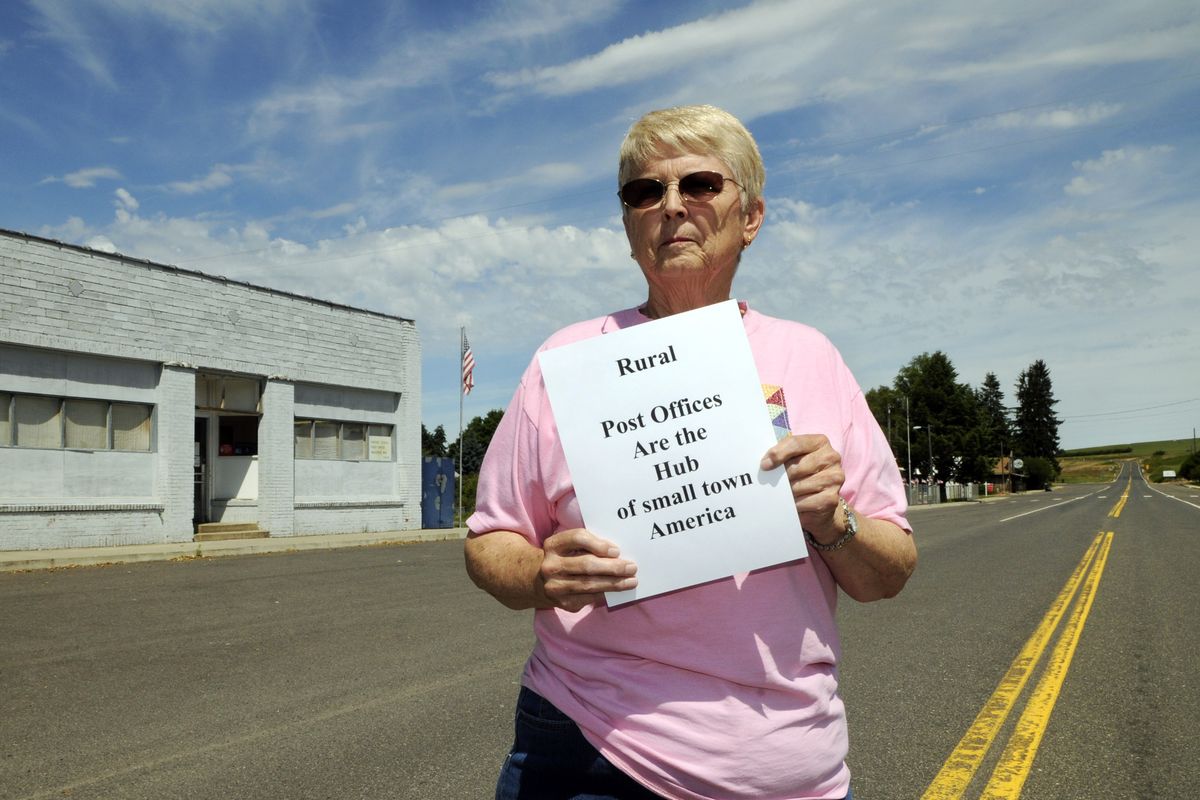Rural Waverly fights to keep its post office
Town Council member and resident historian Evelyn Heinevetter has printed signs in support of the town’s post office building, to the left, in Waverly. Waverly is among about 2,500 small and rural towns with post offices targeted for closure by the USPS. (Dan Pelle)Buy a print of this photo
About half of Waverly showed up Monday night to protest the proposed closing of the town’s U.S. Postal Service office.
The 40 or so people waved signs and expressed disgust with post office officials, saying they’ve responded to citizens’ concerns with form letters.
Waverly is among about 2,500 small and rural towns with post offices targeted for closure by the USPS as part of a $500 million budget-cutting plan.
Town Council member Kim Billington said such a closure would be calamitous: It is the only building in town that is staffed every day.
“This is the link to the outside world for many people here,” she said.
Letter carriers don’t deliver door-to-door in Waverly, making the post office a community kiosk of sorts for the town of about 100 residents.
It’s where people might read a neighbor’s urgent notice about a mama cougar and cub seen in a backyard, where they read a death notice of a friend or learn about a stolen car.
It takes $41,000 to run the post office, said Evelyn Heinevetter, resident historian. That covers a one-person counter and 100 post office boxes. The only other office in Waverly is the town hall/volunteer fire department, which isn’t open every day.
Waverly doesn’t have a café, a bar, grocery store, school, a barber, even a gas station.
It wasn’t until last year that the Internet reached high speed.
Most people in town don’t seem to care much about such trappings. They farm or work 38 miles north in Spokane, or have retired to the quiet life and like it that way.
Resident Janet Price, who is disabled, said she relies on the tiny post office to mail gifts to her grandchildren and write letters to friends.
“If they close it, I don’t know what I’ll do,” she said.
Despite the tough odds of overcoming a federal budget-cutting proposal, Billington said the town is confident.
“We stomped Avista,” she said of Waverly’s success in halting a proposed high-voltage transmission line.
Waverly has a rich but brief history as an important town in southern Spokane County.
A pair of Iowans settled the town in the 1870s. Its largest development happened in 1899 when the Washington State Beet Sugar Co. built a factory along Latah Creek. The half-million-dollar investment brought hundreds of workers, the railroad, hotels, taverns, schools and stores. It already had a post office, Heinevetter said.
The bustle stopped in 1910 when the sugar beet plant closed.
The town then shifted firmly to farming. The verdant hills of the Palouse boast some of the world’s best ground for growing wheat.
Joel Martensen now owns the land where the sugar plant once stood. He said closing post offices in small towns is insensitive. Some worry that Waverly, which was incorporated in 1907, would cease to be recognized and that the residents, at least for the sake of the mail, would be folded into Fairfield, about five miles away.
The people of Waverly said they expect to know later this year the fate of their post office.
In an interview published earlier this year in the Washington Post, Postmaster General Patrick R. Donahoe had this to say: “We have post offices out there that we have two customers, or three customers come in in an entire day.
“Remember the Maytag repairman? He used to have the loneliest job in the world. We probably have about 5,000 postmasters that have the loneliest job in the world.”

